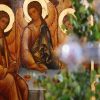What was the Lord Jesus all about? What were His aims? What were the essential traits of His ministry? How is His life and work connected to our own lives today? A verse from today’s Gospel reading (Mat. 9:27-35) gives us a summary of Jesus’ ministry on earth.
“Jesus went about all the cities and villages, teaching in their synagogues and preaching the gospel of the kingdom, and healing every disease and every infirmity.” (Mat. 9:35) This verse sums up the three basic aspects of Jesus’ saving work prior to His death and resurrection. The three aspects are teaching (didaskon), preaching (kerysson) and healing (therapeuon).
Jesus was first of all a keryx, a herald, like a town crier when there were no newspapers or radios. The aim of a town crier was to announce a public message of immediate interest or of great urgency. Jesus went about in towns and villages announcing the news of the arrival of God’s kingdom, an event of the utmost urgency and significance. The way St. Mark the Evangelist says it: “Jesus came into Galilee, preaching (kerysson) the gospel of God, and saying, ‘The time is fulfilled, the kingdom of God is at hand; repent and believe in the gospel.” (Mark 1:14-15).
Jesus’ message is called the gospel of God (euangelion tou Theou). It is a message that derives from God and carries God’s authority. Elsewhere in the New Testament this is also called the gospel of Christ, referring to all of Jesus’ life and work, including His death and resurrection. The gospel is not just any of many messages. It is the core message of Holy Scripture. Gospel (euangelion) means good news, because it reveals the presence and power of God’s kingdom which is the source of all blessings for our salvation. And the Church continues to announce the same message today.
That God is King and that His kingdom rules over all creation is a teaching of the Old Testament too. The prophets to St. John the Baptist exhorted people to turn to God as Lord and King, to trust Him fully, and to worship Him as the only true God. God in His royal authority, presence and power is the source of all life, truth, love, mercy, forgiveness, healing, joy, blessedness. What is new in Christ’s preaching is that God’s kingdom was now powerfully arriving and active in the person, the words and the actions of Jesus. Indeed, because of the mystery of the Incarnation, God took on human flesh, and was fully present in the Lord Jesus, who is Lord and King Himself, and who bestows grace and new life to all.
Because of its very nature, the call of God’s kingdom, and to live within it, is never neutral. “Hear the good news, take it or leave it, go on your way, and don’t worry about it.” No, not at all! The message is God’s call, God’s summons, God’s appeal, and it bears God’s full authority. Jesus cried out: “The kingdom of God is at hand! Repent!” Metanoeite! Meaning, change your minds, change your lives! Repentance (metanoia) literally means an about face, a radical change of mind and heart, putting aside the ways of the world and following the ways of God as revealed to us by Christ. To reject the good news of God’s kingdom is to reject the call of God, to separate ourselves from God, and to live apart from God and His kingdom.
The Orthodox Church has always taught that true repentance (metanoia) consists not only of singular moments of sincere confession of sins. It is also a life-long process of turning to God in faith and love, a continuous inner conversion and renewal throughout our lives. And what is the assured evidence, next to repentance, of our faith and love of God’s kingdom? The evidence is our obedience to and our practice of Christ’s teachings and commandments. He said: “If you love me, you will keep my words and my commandments.” (John 14:15, 24) He charged the disciples to “Go therefore and make disciples of all nations, baptizing them . . . and teaching them to observe all that I have commanded you; and behold, I am with you always, to the end of the ages.” (Mat. 28:19-20)
Christ was a teacher too, conducting a teaching ministry (didache). What did He teach? What were His priorities? Contrary to a popular view Jesus did not come to reject Judaism as a “dead religion.” He came to fulfill and renew Judaism, creating a new people of all nations and races around Himself (Mat. 5:17; 28:19; Gal. 3:26-28). Jesus observed the Mosaic Law according to His own interpretation of it. He was not a violator of God’s law as His opponents claimed. Jesus also followed certain Jewish pious practices such as the wearing of tassels at the end of His robe. Pious practices are cues to God’s presence and reminders of living within God’s kingdom.
What was the problem within Judaism? It was, and is, a similar challenge that we face as Orthodox Christians. The accumulation of traditions and customs, the rich religious legacy itself, can cover up and bury the treasure of a heartfelt conversion and personal communion with God. The purpose of our revealed Faith does not lie in the meticulous observance of externals, which we ought to respect and keep, but in the personal commitment to the living God, the inner life of faith and love of God and of neighbor, to which all the customs and traditions aim.
As teacher (didaskalos) Christ lived and taught the ways and principles of God’s kingdom. He said “Seek first the kingdom of God and His righteousness and everything else will be added to you.” (Mat. 6:23) His highest ethical teaching was love of God and love of neighbor. He taught that we ought to love one another and all people as He loved us. Love is the summation and the embodiment of God’s moral law (Mat. 22:37-40; Rom. 14:8-19).
Jesus taught many other wonderful things. Be peacemakers. Practice non-violence. Speak the truth with forthrightness but also with compassion and humility. He promised that the pure in heart, those who do not harbor evil against anyone or anything, will rejoice in knowing God’s presence in their lives. He treated women with equal respect and dignity, He gave special attention to children, to persons who were lowly, needy, sick.
He challenged His followers to love difficult people, even our rivals and opponents, with the selfless love He taught and lived by. Love is not only about affectionate feelings but also about a mature moral posture to hold, especially when we lack such feelings. It is treating our rivals and opponents, those we disagree with, by the standards of God’s kingdom: patience, understanding, fairness, compassion, love and forgiveness. A tall order, to be sure, but that’s part of the radical demands to live within the realm of God’s kingdom.
Christ also performed miracles and healed people (therapeuon). We refer to Christ as “the physician of our souls and bodies.” The Gospels tell of Jesus’ many miracles and healings. I have spoken on this subject on other occasions and will again speak of it in the future. For now, I conclude this homily by affirming that Christ’s healing ministry is an integral part of His mission on earth. It is a decisive aspect of His saving work, giving evidence of the presence and power of God’s kingdom through Jesus’ actions.
Jesus said: “The blind receive their sight and the lame walk, lepers are cleansed and the deaf hear. . . . Blessed is he who takes no offense at me.” (Mat. 11:5-6) Christ “took our infirmities and bore our diseases.” (Isaiah 53:4/Mat. 8:17) We ought to do the same for one another. In the words of St. Paul: “We who are strong ought to bear with the failings of the weak, and not to please ourselves . . . for Christ did not please Himself.” (Rom 15:1-3) Rather He offered His very life for the salvation of the world. To the Lord Jesus, preacher, teacher and healer, our Lord and King and Savior, be all the honor, praise and glory forever. Amen.
















